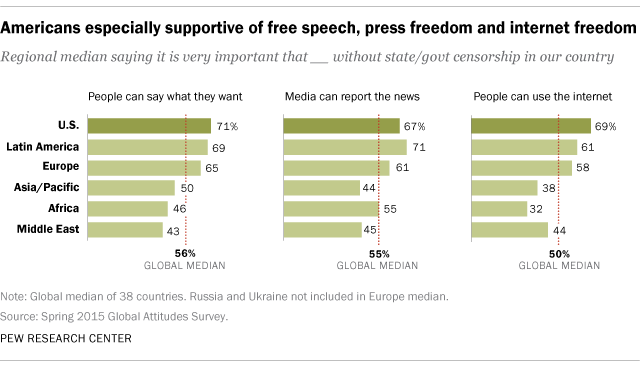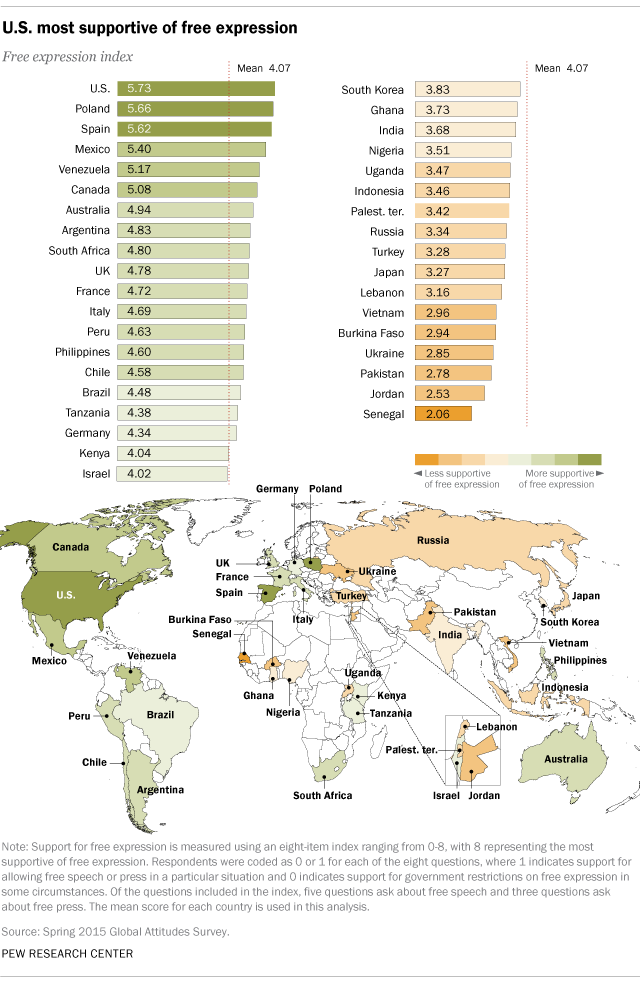In a variety of arenas, Americans are debating the boundaries of free expression. Dean John Ellison’s recent welcome letter to incoming University of Chicago freshmen proclaimed that the school would not support “safe spaces” or “trigger warnings,” pouring more fuel on heated debates about campus free speech. San Francisco 49ers quarterback Colin Kaepernick generated controversy by kneeling during the national anthem as a protest against racial injustice in the United States. And social media sites like Twitter and Facebook are struggling with how to handle online hate speech.

Enshrined in the Bill of Rights, free expression is a bedrock American principle, and Americans tend to express stronger support for free expression than many others around the world. A 38-nation Pew Research Center survey conducted in 2015 found that Americans were among the most supportive of free speech, freedom of the press and the right to use the internet without government censorship.
Moreover, Americans are much more tolerant of offensive speech than people in other nations. For instance, 77% in the U.S. support the right of others to make statements that are offensive to their own religious beliefs, the highest percentage among the nations in the study. Fully 67% think people should be allowed to make public statements that are offensive to minority groups, again the highest percentage in the poll. And the U.S. was one of only three nations where at least half endorse the right to sexually explicit speech. Americans don’t necessarily like offensive speech more than others, but they are much less inclined to outlaw it.
To get a summary measure of support for free expression around the world, we built an index based on five survey questions about free speech and three about free media. Using this measure, Americans emerge as the biggest supporters of free expression among the 38 nations studied. And unlike so many other issues in the U.S., wide open, free-ranging public debate has an appeal across party lines. There are relatively few differences between Democrats, Republicans and independents when it comes to free expression.

However, there are some important generational differences on this issue. For instance, 40% of U.S. Millennials think the government should be able to prevent people from making statements that are offensive to minority groups, compared with 27% of those in Generation X, 24% of Baby Boomers, and just 12% of Silent Generation Americans. Nonwhite respondents (38%) are also more likely to hold this view than whites (23%).
Apart from debates over whether offensive language should be legal, most Americans believe people are just too easily offended nowadays. In a 2016 Pew Research Center survey, 59% agreed with the statement “Too many people are easily offended these days over the language that others use,” while only 39% said “people need to be more careful about the language they use to avoid offending people with different backgrounds.”
On this question, however, there is a sharp partisan divide. Nearly eight-in-ten Republicans (78%) and 68% of independents say people are too easily offended these days, compared with just 37% of Democrats. And supporters of the major party nominees see this issue very differently. Among registered voters, 83% of Donald Trump supporters believe too many people are easily offended; only 39% of Hillary Clinton voters agree.
